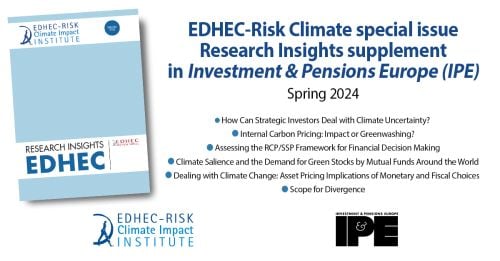
Spring 2024 EDHEC-Risk Climate special issue of IPE's Research Insights published
Written on 03 Apr 2024.

Our first Research Insights supplement for Investment & Pensions Europe (IPE) provides science-based answers to pressing investment questions in relation to climate change and related policies
Since 2001, EDHEC Business School has pursued an ambitious research agenda, blending academic excellence with practical relevance. Our approach involves advancing scientific inquiry in areas where we possess expertise and highlighting practical implications for decision-makers.
This approach originated from EDHEC-Risk Institute, now evolved into EDHEC-Risk Climate Impact Institute as testament of the School’s commitment to helping organizations integrate sustainability risk and impact considerations into strategic and operational decision-making processes.
The lead article for this issue presents groundbreaking climate risk modeling work. The climate scenario framework has developed from the need to inform public policy and was never meant to serve the needs of investors. No asset pricing implications can be drawn from reference scenarios that lack probabilistic information. Penned by PMR Quant Researcher of the Year for 2022 Professor Riccardo Rebonato, the article describes how to identify strong relationships among economic, demographic, and technological variables and derive probability distributions of climate outcomes. These enable investors to gauge the level of uncertainty they face, and discern which outcomes are more likely, thus warranting greater attention. Further work extending and repurposing climate scenario analysis will be performed with the support of index provider Scientific Beta (an SGX and EDHEC venture).
Drawing on these advances, our researchers subject the IPCC RCP/SSP framework to scrutiny using model risk management approaches. They underscore the importance of consistently modelling key risk drivers, also highlighting potential shortcomings in the framework’s design, which may foster a false sense of security regarding the impacts of climate change and the trajectory of the climate transition. In this latter respect, they contend that the next phase of decarbonisation is likely to require major public involvement and illustrate how debt financing could impact government bond prices and influence equity valuation.
Two contributions in this issue examine the investor value and greenwashing risks associated with two key metrics identified by the Task Force on Climate-related Financial Disclosures. The first contribution documents the lack of correlation between disclosure of internal carbon prices by corporates and intensity reductions. The second explores the materiality of value chain emissions. The potential inclusion of “Scope 3” emissions in SEC-mandated disclosures has revealed divisions between investors, who would welcome such disclosures, and fossil fuel interests who mounted a successful influence and lobbying campaign against them. The article identifies critical data deficiencies and offers recommendations for investors and standard setters.
The final contribution investigates how global extreme weather events influence mutual fund managers’ investment decisions, suggesting portfolio greening in response to climate events. It benefited from the support of Amundi.
Whether concerned about the impact of climate change on asset pricing and investment management, or seeking evidence-based approaches to green investments, this supplement offers valuable research perspectives to stay at the forefront of the profession and the top of the conversation.
The first EDHEC-Risk Climate issue of the Research Insights supplement to Investment & Pensions Europe proposes the following articles:
How Can Strategic Investors Deal with Climate Uncertainty? by Riccardo Rebonato, EDHEC-Risk Climate Scientific Director
Internal Carbon Pricing: Impact or Greenwashing?, by Gianfranco Gianfrate, Research Director, EDHEC-Risk Climate Impact Institute
Assessing the RCP/SSP Framework for Financial Decision Making, by Dherminder S. Kainth, Research Director, EDHEC-Risk Climate Impact Institute
Climate Salience and the Demand for Green Stocks by Mutual Funds Around the World, by EDHEC Professor Dominic O’Kane, Research Director, EDHEC-Risk Climate Impact Institute and EDHEC Professor Teodor Dyakov, Affiliate Member, EDHEC-Risk Climate Impact Institute
Dealing with Climate Change: Asset Pricing Implications of Monetary and Fiscal Choices, by Riccardo Rebonato, EDHEC-Risk Climate Scientific Director
Scope for Divergence – The Status of Value Chain Emissions Accounting, Reporting and Estimation and Implications for Investors and Standard Setters, by Frédéric Ducoulombier, Director, EDHEC-Risk Climate Impact Institute
Related link:
IPE EDHEC-Risk Climate special issue, Research Insights Supplement Spring 2024

